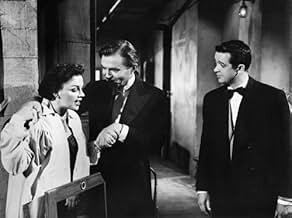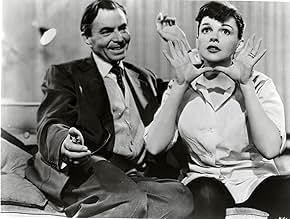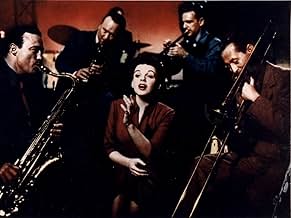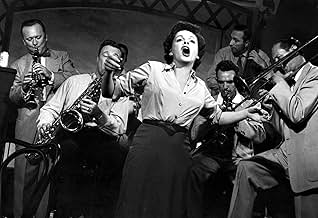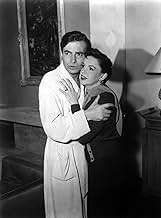VALUTAZIONE IMDb
7,5/10
20.538
LA TUA VALUTAZIONE
Una star del cinema aiuta una giovane cantante e attrice a trovare la fama, anche se l'età e l'alcolismo inviano la propria carriera in una spirale verso il basso.Una star del cinema aiuta una giovane cantante e attrice a trovare la fama, anche se l'età e l'alcolismo inviano la propria carriera in una spirale verso il basso.Una star del cinema aiuta una giovane cantante e attrice a trovare la fama, anche se l'età e l'alcolismo inviano la propria carriera in una spirale verso il basso.
- Regia
- Sceneggiatura
- Star
- Candidato a 6 Oscar
- 7 vittorie e 14 candidature totali
Tommy Noonan
- Danny McGuire
- (as Tom Noonan)
John Alban
- Academy Awards Attendee
- (non citato nei titoli originali)
Laurindo Almeida
- Guitarist
- (non citato nei titoli originali)
Leon Alton
- Usher
- (non citato nei titoli originali)
Rudolph Anders
- Mr. Ettinger
- (non citato nei titoli originali)
David Armstrong
- Soundman
- (non citato nei titoli originali)
Phil Arnold
- Agent #3
- (non citato nei titoli originali)
Nadine Ashdown
- Esther - Age 6
- (non citato nei titoli originali)
Gertrude Astor
- Racetrack Spectator
- (non citato nei titoli originali)
Recensioni in evidenza
Who would have thought? Cukor, never having worked in colour before AND never having worked in widescreen before did the best piece of work of his career here. 'The Man That Got Away' is always considered one of the best musical numbers to come out of old Hollywood: but wait until you've seen it in widescreen. It's not even the same number, and you get why people who've seen this film in theatres revere the number. Some of the compositions (especially during the opening set piece) aren't just Cukor's best work, they rival anyone's from that era. Let me reitierate: see it in widescreen or trust those of us who have. This musical/ melodrama/tragedy set the bar so high that 50 years later people remember this film but not the musical that got a best picture nomination that year, OR, the performance that won Best Actress that year.
The 1954 musicalized version of A Star Is Born is a great film. Judy Garland and James Mason (both Oscar nominated) turn in terrific performance as Esther and Norman. Like its 1937 predecessor (which starred Janet Gaynor and Fredric Marchboth Oscar nominated), the 1954 version follows the ups and down of two people set against the vicious world of Hollywood. The newer version sticks to the basic story but adds some great numbers for Garland, including "The Man That Got Away" and "I Was Born in a Trunk." In a major comeback, Garland had not worked in films since Summer Stock (1950), and her performance here is the best of her career. That she lost the Oscar to Grace Kelly for The Country Girl is one of Hollywood's great inequities. Mason lost to Marlon Brando for On the Waterfront. Garland sings superbly and is a great comic and dramatic actress. Her Esther is more vulnerable than Gaynor's just as Mason's Norman is more pathetic than March's. I love both versions. Charles Bickford and Jack Carson play the other major parts, played by Adolphe Menjou and Lionel Stander in 1937. Two major supporting roles from the 1937 version were cut from the 1954 version: Esther's first Hollywood friend (Andy Devine) and her intrepid grandmother (the great May Robson). But Garland's musical numbers make up for their absence. Oddly, despite the great hullabaloo surrounding A Star Is Born, it was not nominated for best picture, and George Cukor was bypassed in the directing category. One of the best musicals ever made.
Count me among those who love this film, but am I the only one who feels for Libby, played by Jack Carson? Yes, he's snide and spiteful, but for God's sake, who wouldn't be in his shoes? When he says, "Norman Maine's charm escapes me." I tend to agree with him. What makes this violent drunk so special anyway, except that he's played by James Mason? And, although she's played by Judy Garland at her radiant best, isn't Esther a classic co-dependent wife? Have any of you adoring fans ever actually dealt with a close one who's alcoholic?
When the studio mogul says, after Norman Maine dies, "you didn't know him at all," I feel like arguing the point. Libby should say, "Maybe YOU didn't know him, Oliver. Did he ever insult you for making him do his job? Did he ever punch you out? Did you ever have to continually face his dirty side, as I did, which he--and you too, Oliver--refused to confront?"
Maybe I'm a poop. But I had to say it.
And, yes, it's a brilliant film.
When the studio mogul says, after Norman Maine dies, "you didn't know him at all," I feel like arguing the point. Libby should say, "Maybe YOU didn't know him, Oliver. Did he ever insult you for making him do his job? Did he ever punch you out? Did you ever have to continually face his dirty side, as I did, which he--and you too, Oliver--refused to confront?"
Maybe I'm a poop. But I had to say it.
And, yes, it's a brilliant film.
In a career of classic performances this may be Judy Garland's best role and one that certainly uses her many talents to the hilt. James Mason gives an Oscar caliber performance as well and I believe in almost any other year that he wasn't up against Brando's "On the Waterfront" performance he would and should have won.
This George Cukor film features gorgeous color and beautiful cinematography, but does suffer from choppy editing that may be the result of restored footage. The project to restore over an hour of missing footage scrapped by the producers after the original length was in excess of four and a half hours may have been done with the best intentions, but is still incomplete and leaves the film disjointed and obviously lacking. I certainly wish the original footage was never scrapped, but this spotty attempt at restoration makes you feel like your watching more of a project than a classic film. Sometimes less is more and definitely in this case.
Whatever you do make sure you see the widescreen version of this film that was originally shot in Cinemascope or you will only see about a third of the actual picture and I assure you, you won't want to miss any of it.
This George Cukor film features gorgeous color and beautiful cinematography, but does suffer from choppy editing that may be the result of restored footage. The project to restore over an hour of missing footage scrapped by the producers after the original length was in excess of four and a half hours may have been done with the best intentions, but is still incomplete and leaves the film disjointed and obviously lacking. I certainly wish the original footage was never scrapped, but this spotty attempt at restoration makes you feel like your watching more of a project than a classic film. Sometimes less is more and definitely in this case.
Whatever you do make sure you see the widescreen version of this film that was originally shot in Cinemascope or you will only see about a third of the actual picture and I assure you, you won't want to miss any of it.
This is a great film. Yes it is long. Yes some of the songs should have been cut but they weren't but we get a masterpiece anyway.
In this film Esther Blodgett is a talented aspiring singer with a band, and Norman Maine is a former matinee idol with a career in the early stages of decline. When he arrives intoxicated at a function at the Shrine Auditorium, the studio publicist attempts to keep him away from reporters. After an angry exchange, Norman rushes away and bursts onto a stage where an orchestra is performing. Esther takes him by the hand and pretends he is part of the act, thereby turning a potentially embarrassing and disruptive moment into an opportunity for the audience to greet Norman with applause.
Norman then takes Esther under his wing and gets her a screen test at the studio in which he works. She ends up homecoming a major star and his drinking escalates!
After the film was released Warner Brothers recalled the prints. 30 minutes were edited out. In 1983 Ron Haver was able to restore most of the film. Where he could not find footage for the missing scenes he used productions stills. People claim this halts the picture. It doesn't! Besides it only last a total of 7 minutes. It is not 7 minutes all at once!
Now in 2010 it was reported that film restorer Michael Arick had a print of this film. He will not let Warner Brothers use the print. Some people claim that he doesn't have a print however "He has never publicly denied it".
It is also Rumored that Tommy from Beverly Hills has hours of the films outtakes on VHS however it is silent footage. Maybe it might include the missing 7 minutes.
In this film Esther Blodgett is a talented aspiring singer with a band, and Norman Maine is a former matinee idol with a career in the early stages of decline. When he arrives intoxicated at a function at the Shrine Auditorium, the studio publicist attempts to keep him away from reporters. After an angry exchange, Norman rushes away and bursts onto a stage where an orchestra is performing. Esther takes him by the hand and pretends he is part of the act, thereby turning a potentially embarrassing and disruptive moment into an opportunity for the audience to greet Norman with applause.
Norman then takes Esther under his wing and gets her a screen test at the studio in which he works. She ends up homecoming a major star and his drinking escalates!
After the film was released Warner Brothers recalled the prints. 30 minutes were edited out. In 1983 Ron Haver was able to restore most of the film. Where he could not find footage for the missing scenes he used productions stills. People claim this halts the picture. It doesn't! Besides it only last a total of 7 minutes. It is not 7 minutes all at once!
Now in 2010 it was reported that film restorer Michael Arick had a print of this film. He will not let Warner Brothers use the print. Some people claim that he doesn't have a print however "He has never publicly denied it".
It is also Rumored that Tommy from Beverly Hills has hours of the films outtakes on VHS however it is silent footage. Maybe it might include the missing 7 minutes.
Lo sapevi?
- QuizGeorge Cukor offered Marlon Brando the role of Norman Maine on the set of Giulio Cesare (1953). "Why would you come to me?" asked Brando. "I'm in the prime of my life... If you're looking around for some actor to play an alcoholic has-been, he's sitting right over there"- pointing at his costar James Mason, who got the part.
- BlooperAfter Vicki comes home and she performs in her house for Norman, the doorbell rings and he goes to the door to accept a package for Vicki. His hair is all mussed-up when he goes to the door, but after he closes it and the camera goes back to him, there isn't a hair out of place. Then he walks over to where Vicki is and his hair is all mussed-up again.
- Citazioni
[last lines]
Vicki Lester: Hello, everybody. This is Mrs. Norman Maine.
- Versioni alternativeContrary to popular belief, the film was not originally at 181 minutes, but rather 196 (3hrs. and 16mins.) at a post-premiere shown on August 8, 1954 in Huntington Park, California. After its second post-premiere - the very next day - two scenes of 15 minutes total were deleted; making the film run its original world debut length at 181 minutes. One was a number called "When My Sugar Walks Down the Street" that came after Judy's take of "I'll Get By" in the 'Born in the Trunk' sequence, the other was a scene where Garland and James Mason's characters (Vicki and Norman) were picnicking on the beach; production stills and promotional advertisements are the only thing left in existence of the footage. After its world premiere on September 29, 1954, 27 minutes was cut, bringing it down to a mediocre 154 time length. Those scenes were:
- 1) Esther quitting the band
- 2) The Trinidad Coconut Oil Shampoo
- 3) Esther working at a drive-in
- 4) Norman being driven away drunk in his car
- 5) Norman inquiring Esther's old landlady
- 6) Spotting Esther on the TV commercial
- 7) Tracking down Esther at her new boarding residence
- 8) Driving down the strip - Esther getting sick
- 9) "Here's What I'm Here For" musical number - Norman proposes
- 10) "Lose That Long Face" musical number - Vicki breaks down
- ConnessioniFeatured in Film Night: Special: Forty Years in Hollywood (1970)
- Colonne sonoreGotta Have Me Go with You
(uncredited)
Music by Harold Arlen
Lyrics by Ira Gershwin
Performed by Judy Garland with Jack Harmon & Don McKay
I più visti
Accedi per valutare e creare un elenco di titoli salvati per ottenere consigli personalizzati
Dettagli
- Data di uscita
- Paese di origine
- Lingua
- Celebre anche come
- Nace una estrella
- Luoghi delle riprese
- Azienda produttrice
- Vedi altri crediti dell’azienda su IMDbPro
Botteghino
- Budget
- 5.019.770 USD (previsto)
- Lordo Stati Uniti e Canada
- 4.335.968 USD
- Lordo in tutto il mondo
- 4.350.001 USD
- Tempo di esecuzione
- 2h 34min(154 min)
- Proporzioni
- 2.55 : 1
Contribuisci a questa pagina
Suggerisci una modifica o aggiungi i contenuti mancanti








